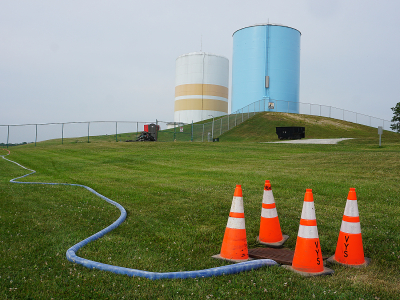School’s 2020 plan kicks off
- Published: December 16, 2010
The Yellow Springs School Board’s Class of 2020 strategic planning process kicked off Saturday morning with a community workshop at the Glen Helen Building. About 40 community members attended the session led by KnowledgeWorks, an education consulting firm chosen to broaden the field of options for positive change for the local schools. The firm worked with the district’s teachers on Friday and will return to Yellow Springs on Jan. 27 for a second presentation.
The initial KnowledgeWorks workshops, in conjunction with additional presentations from educational experts this winter, are intended to act as the “expansive thinking” part of the district’s strategic plan, School Board Vice-President Benji Maruyama said on Saturday. The board plans to choose a second consultant to lead the actual 10-year strategic planning process, which is expected to be completed before the end of the current school year. The plan is expected to address current educational gaps, future student needs and a large budget deficit expected to begin in 2012.
KnowledgeWorks’ senior researcher Katherine Prince introduced Saturday’s session with some key predictions for the future of education, which is likely to rely heavily on social networking and information technology with a focus on the ability of each child to customize his or her education. Prince gave some examples of organizations that are beginning to operate in this manner.
Purdue University, for example, uses a Facebook application called “Mixable,” which allows students to continue working together on classroom material outside of class and to control where their explorations lead. Butler Tech, an academy for the arts, has students engage in reading and writing online and use on-campus time to make art in the studio. Tinkering School is a summer camp in Montara, Calif., where kids explore basic and advanced building techniques in a collaborative environment and “learn by fooling around…[g]rand schemes, wild ideas, crazy notions, and intuitive leaps of imagination are, of course, encouraged and fertilized,” the school’s Web site says. Another organization called Nature Mapping develops curricula based on current scientific research projects, such as one study on the horny toad, which allows kids to work alongside scientists to gather data, make sense of it and contribute academically to the world in a real way, Prince said.
As a discussion-generating exercise, participants at Saturday’s workshop were arranged in groups of five and asked to brainstorm what kinds of things various hypothetical learners would need to succeed in the future.
The ultimate goal for the future of education, according to Prince, will be to allow future learners to go from a “world of schooling to a world of learning.”
The value of Saturday’s workshop, according to participant Al Schlueter, was found largely in the number of community members who devoted time to talking about what the future of education should look like here. A lot of ideas were shared, but participants Moira Laughlin and Richard Zopf said afterward that it was unclear whether the community’s input would actually be utilized toward an end goal. Later that day Schlueter went to the Little Art Theatre to see Waiting for Superman, a documentary about grassroots movements acting to close the achievement gap, and found the discussion there to be even more inspiring about the power of community to create positive change for local school systems.
“The Little Art film said that all the successful efforts seemed to start from within — the community getting involved and actively participating in solving the problem,” he said.
Friday’s KnowledgeWorks workshop for the district’s teaching staff was an expanded version of Saturday’s community session, School Board President Sean Creighton said. The intent was to have teachers look outside the current system and see other models. Some teachers weren’t surprised at the things they saw, he said, which could mean that Yellow Springs schools are already on the right path toward creating an innovative, interactive learning environment.
“Maybe they don’t show us anything that’s radically different — maybe we recognize the future, and maybe it’s taking the best of what we do now and making it a common practice throughout the entire district,” he said.
Saturday’s community workshop also might not have generated radical ideas, but it was a starting point to engage in crafting a plan for the future, Creighton said. KnowledgeWorks has done much research in best practices in K–12 public education across the nation, particularly with schools that are advancing student achievement, he said. The presentation on Jan. 27 will include some of these examples as well as financial models to consider, and, along with other speakers that month, will allow the community to consider the perspective of various experts in the field of education, he said.
“Yellow Springs has the great advantage of the practice of dialogue and processing,” Creighton said. “What 2020 challenges us to do is dialogue about our public schools and its future, which is something we have not gone through intentionally as a district or a community.”
The Yellow Springs News encourages respectful discussion of this article.
You must login to post a comment.
Don't have a login? Register for a free YSNews.com account.












No comments yet for this article.